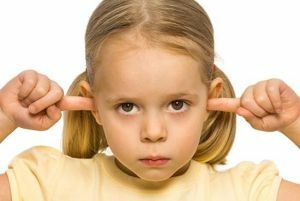 In psychology, under negativism, we mean the resistance of a person deprived of rational prerequisites to any external influence, even in spite of one's own well-being.
In psychology, under negativism, we mean the resistance of a person deprived of rational prerequisites to any external influence, even in spite of one's own well-being.
In a more general sense, this concept denotes generally a negative perception of the world around us, a desire to do everything in spite of requests and expectations.
In pedagogy, the term "negativism" is applied to children who are characterized by an oppositional manner to behave with people who should be their authority( teachers, parents).
Contents
- Active and passive form of resistance
- Related concepts
- Complex of causes and factors
- Relationship with age
- Critical ages
- Pathological resistance in children of 3 years
- View from
- How does it feel from inside
- What if it touches your relatives?
- Not allowed - the best, but at times difficult output
Active and passive form of resistance
It is accepted to distinguish two basic forms of negativism: active and passive. Passive negativism is expressed in absolute ignoring of demands and requests.
With active form, a man shows aggression and sharply resists any attempts to influence him. As one of the subspecies of active negativism, one can distinguish paradoxical when a person does everything on purpose in reverse, even if this is at variance with his real desires.
Separately there are purely physiological manifestations of this condition, when a person refuses to eat, practically does not move, does not speak.
Related concepts
Negativism is included in the trio of manifestations of the complex of protest behavior of the child.
The second component is stubbornness, which can be considered a form of negativity, with the only amendment that stubbornness in any matter has its own specific reasons, while negativism is not a resistance motivated by anything. These phenomena are united by the fact that one and the other arises on the basis of purely subjective sensations of man.
One of the closest to negativism( as a psychiatric term) phenomenon is mutism. This is a condition in which a person avoids any communication either through speech or gestures. But, unlike negativism, mutism is mainly a consequence of a strong shock.
The third component is obstinacy, the difference from stubbornness is that it is directed not at a particular person, but in general on a system of upbringing, the development of events and so on.

Complex of causes and factors
As a psychiatric diagnosis, negativism is most often observed in the development of catatonic syndrome( schizophrenia, agitation and stupor), autism, dementia( including senile) and certain types of depression.
When negativism is implied in a broader context, among the reasons for its occurrence, it is first and foremost to refer to  as a frustration caused by prolonged and very strong dissatisfaction with life circumstances and the surrounding environment. In turn, this frustration creates a strong psychological discomfort, for compensation of which a person resorts to negativistic behavior.
as a frustration caused by prolonged and very strong dissatisfaction with life circumstances and the surrounding environment. In turn, this frustration creates a strong psychological discomfort, for compensation of which a person resorts to negativistic behavior.
Another possible reason for the emergence of resistance may be difficulties with communication in humans. In this case, such a state arises as a hypercompensatory reaction to one's own communicative problems.
In the form of fierce stubbornness, negativism arises as a response to attempts at external influences that diverge from personal needs and desires of a person. Such a reaction is conditioned by a person's need for his own opinion, self-expression, control over his own life.
Relationship with age
Age crises that characterize the transition from one life period to another are often accompanied by changes in character and thinking, frequent changes in mood.
At this time a person becomes conflicted and even to some extent aggressive, a pessimistic view of the world prevails. Negativism is almost always a symptom of a crisis that manifests itself in stressful situations, when a person is as vulnerable and vulnerable as possible.
Critical ages
During life, a person experiences several age-related crises, most of which occur at age 20:
- a newborn's crisis;
- crisis of the 1st year of life;
- crisis 3 years;
- crisis of 6-7 years( "school crisis");
- crisis of adolescence( approximately from 12 to 17 years).
In adult life, a person waits for only two critical periods associated with the transition from one age to another:
- midlife crisis;
- stress associated with retirement.
Pathological resistance in children of 3 years
 Naturally, the first two periods of negativity is not typical, but at the age of three, when children begin to show a desire for independence, parents face the first manifestations of childish stubbornness and categorical.
Naturally, the first two periods of negativity is not typical, but at the age of three, when children begin to show a desire for independence, parents face the first manifestations of childish stubbornness and categorical.
That's why this period is often called "I myself", since this name best describes the state of the child in three years. The child wants to perform most of the actions on his own, but the desires do not coincide with the possibilities, which leads to frustration, which, as already mentioned above, is one of the main reasons for this state.
It should not be confused with negativity and simple disobedience of the child. When a kid refuses to do what he does not want, that's fine. Negativism manifests itself in those situations where the child refuses to perform any actions exactly in the event that it was offered to him by adults.
View from
If we talk about the psychiatric term, then in this case negativity itself is a symptom to a certain number of diseases. In this case, depending on the form( active or passive), it can manifest itself both in demonstrative disobedience and in passive resistance to any requests of the doctor, which is in this case its most important feature.
As for negativism from the pedagogical or general psychological point of view, the main external manifestations in this case will be speech and behavioral signs:
- difficulties with communication, interaction with others, even the closest people;
- conflict;
- refusal to compromise;
- skepticism and mistrust, bordering on paranoia.
How it is felt from within
The sensations of the person are quite difficult to describe, in the first place because such people rarely realize their state of  as abnormal.
as abnormal.
The internal state will be characterized by an extreme degree of entanglement in one's own desires and needs, conflicts with oneself, sometimes autoaggression.
The passive form in this case can be felt as the inhibition of consciousness, extreme indifference towards all surrounding things and people.
What should I do if this affects your family?
If it seems to you that one of your relatives has signs of negativity in behavior, then, first of all, it is necessary to turn to a psychologist or psychotherapist to solve internal problems that caused such a state, because in itself such pathological stubbornness is onlyconsequence, therefore, in order to overcome it, it is necessary to work with the root cause.
Among the methods of psychotherapy to preschool children and junior schoolchildren, play therapy, art therapy, fairy tale therapy, etc. are most suitable.
 For cognitive-behavioral therapy, adolescent negativists and adults are best served by cognitive-behavioral therapy. It is also important not to forget your own attitude towards your relatives. Psychotherapy will be most successful only if you work on this problem in a team.
For cognitive-behavioral therapy, adolescent negativists and adults are best served by cognitive-behavioral therapy. It is also important not to forget your own attitude towards your relatives. Psychotherapy will be most successful only if you work on this problem in a team.
In order to correct negativistic behavior and whenever possible to avoid any conflicts, it is necessary to show ingenuity. Especially it concerns children.
It is necessary to exclude any psychological pressure on the child, in no case there should be threats or physical punishment - this will only aggravate the situation. You will have to apply the so-called "soft power" - negotiate, adjust, compromise.
It is generally desirable to avoid situations in which a conflict may arise.
Your main task is that the child begins to follow positive patterns of communication and interaction with others. Do not forget to praise him every time he does something good, makes concessions, helps you, quietly communicates with other people. In overcoming negativism, the mechanism of positive reinforcement plays a crucial role.
To prevent - the best, but at times difficult, output of
In order to prevent the development of such a state in children and elderly people, it is first and foremost necessary to surround them with care and attention.
It is important to ensure that the socialization and integration of children into society is as successful and seamless as possible, and the elderly do not lose communication skills. 
You can not put pressure on people( of any age) and impose your views on them, force them to do what they do not want.
It is necessary to ensure that there is no feeling of frustration, especially carefully it is necessary to observe your own condition. Frustration is the first step towards negativism.
The most important thing to remember about all of the above: negativism is not a cause, but a consequence. You can get rid of it only by getting rid of the problem that caused it.
It is also important to remember and not to confuse the term, which in psychology and pedagogy denotes irrational resistance to any impact with simple obstinacy and disobedience inherent in all children.
The behavior of a person with negativism is successfully amenable to correction. It is advisable to consult a professional doctor.



